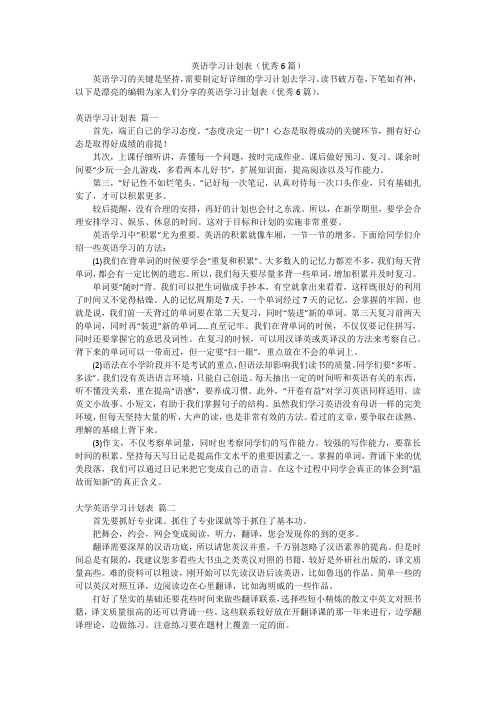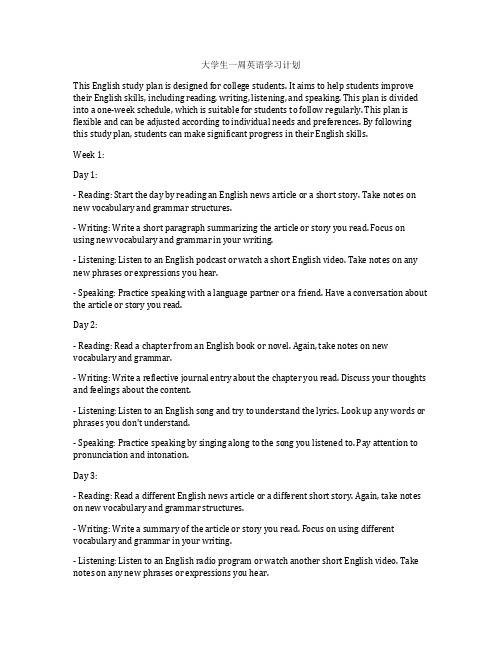大学英语学习计划表
英语学习计划表(优秀6篇)

英语学习计划表(优秀6篇)英语学习的关键是坚持,需要制定好详细的学习计划去学习。
读书破万卷,下笔如有神,以下是漂亮的编辑为家人们分享的英语学习计划表(优秀6篇)。
英语学习计划表篇一首先,端正自己的学习态度。
“态度决定一切”!心态是取得成功的关键环节,拥有好心态是取得好成绩的前提!其次,上课仔细听讲,弄懂每一个问题,按时完成作业。
课后做好预习、复习。
课余时间要“少玩一会儿游戏,多看两本儿好书”,扩展知识面,提高阅读以及写作能力。
第三,“好记性不如烂笔头。
”记好每一次笔记,认真对待每一次口头作业,只有基础扎实了,才可以积累更多。
较后提醒,没有合理的安排,再好的计划也会付之东流。
所以,在新学期里,要学会合理安排学习、娱乐、休息的时间。
这对于目标和计划的实施非常重要。
英语学习中“积累”尤为重要。
英语的积累就像车厢,一节一节的增多。
下面给同学们介绍一些英语学习的方法:(1)我们在背单词的时候要学会“重复和积累”。
大多数人的记忆力都差不多,我们每天背单词,都会有一定比例的遗忘。
所以,我们每天要尽量多背一些单词,增加积累并及时复习。
单词要“随时”背。
我们可以把生词做成手抄本,有空就拿出来看看,这样既很好的利用了时间又不觉得枯燥。
人的记忆周期是7天,一个单词经过7天的记忆,会掌握的牢固。
也就是说,我们前一天背过的单词要在第二天复习,同时“装进”新的单词。
第三天复习前两天的单词,同时再“装进”新的单词……直至记牢。
我们在背单词的时候,不仅仅要记住拼写,同时还要掌握它的意思及词性。
在复习的时候,可以用汉译英或英译汉的方法来考察自己。
背下来的单词可以一带而过,但一定要“扫一眼”,重点放在不会的单词上。
(2)语法在小学阶段并不是考试的重点,但语法却影响我们读书的质量。
同学们要“多听、多读”。
我们没有英语语言环境,只能自己创造。
每天抽出一定的时间听和英语有关的东西,听不懂没关系,重在提高“语感”,要养成习惯。
此外,“开卷有益”对学习英语同样适用。
大学生一周英语学习计划

大学生一周英语学习计划This English study plan is designed for college students. It aims to help students improve their English skills, including reading, writing, listening, and speaking. This plan is divided into a one-week schedule, which is suitable for students to follow regularly. This plan is flexible and can be adjusted according to individual needs and preferences. By following this study plan, students can make significant progress in their English skills.Week 1:Day 1:- Reading: Start the day by reading an English news article or a short story. Take notes on new vocabulary and grammar structures.- Writing: Write a short paragraph summarizing the article or story you read. Focus on using new vocabulary and grammar in your writing.- Listening: Listen to an English podcast or watch a short English video. Take notes on any new phrases or expressions you hear.- Speaking: Practice speaking with a language partner or a friend. Have a conversation about the article or story you read.Day 2:- Reading: Read a chapter from an English book or novel. Again, take notes on new vocabulary and grammar.- Writing: Write a reflective journal entry about the chapter you read. Discuss your thoughts and feelings about the content.- Listening: Listen to an English song and try to understand the lyrics. Look up any words or phrases you don't understand.- Speaking: Practice speaking by singing along to the song you listened to. Pay attention to pronunciation and intonation.Day 3:- Reading: Read a different English news article or a different short story. Again, take notes on new vocabulary and grammar structures.- Writing: Write a summary of the article or story you read. Focus on using different vocabulary and grammar in your writing.- Listening: Listen to an English radio program or watch another short English video. Take notes on any new phrases or expressions you hear.- Speaking: Practice speaking with a different language partner or friend. Have a conversation about the article or story you read.Day 4:- Reading: Read a different chapter from the English book or novel you started. Take notes on new vocabulary and grammar.- Writing: Write a reflective journal entry about the new chapter you read. Discuss your thoughts and feelings about the content.- Listening: Listen to a different English song and try to understand the lyrics. Look up any words or phrases you don't understand.- Speaking: Practice speaking by singing along to the new song you listened to. Pay attention to pronunciation and intonation.Day 5:- Reading: Review the articles, stories, and chapters you read earlier in the week. Pay attention to the vocabulary and grammar you learned.- Writing: Write a short essay summarizing what you learned from the reading and listening activities this week. Focus on using new vocabulary and grammar.- Listening: Listen to a longer English podcast or watch a longer English video. Take notes on any new phrases or expressions you hear.- Speaking: Practice speaking with a different language partner or friend. Have a longer conversation about the topics you learned about this week.Day 6:- Reading: Read an English article or short story that is related to your major or interests. Take notes on new vocabulary and grammar.- Writing: Write a response or analysis of the article or story you read. Use the vocabulary and grammar you learned to discuss the content.- Listening: Listen to an English speech or lecture. Take notes on any new phrases or expressions you hear.- Speaking: Practice giving a short presentation or speech about the article or story you read. Use the vocabulary and grammar you learned.Day 7:- Reading: Review everything you have read throughout the week. Pay attention to the vocabulary and grammar you learned.- Writing: Write a longer essay or reflection on what you learned this week. Use as much of the new vocabulary and grammar as you can.- Listening: Listen to an English audiobook or watch an English movie. Pay attention to the language and take notes on any new phrases or expressions- Speaking: Practice speaking by summarizing the audiobook or movie you listened to or watched. Use the vocabulary and grammar you learned.This study plan is designed to help college students improve their English skills in a comprehensive and balanced way. By following this plan, students will have the opportunity to read, write, listen, and speak in English on a daily basis. This will help them become more fluent and confident in using the language. Additionally, the plan can be easily adapted to suit different interests and levels of proficiency. By sticking to this plan and adjusting it as needed, students will see significant improvements in their English skills over time.。
大学四年学习英语计划

大学四年学习英语计划第一年:第一年的重点是打好英语基础。
我将花费大量时间学习英语的基础知识,包括语法、词汇和听力技能。
我计划每天至少花费一个小时的时间用英语阅读和听力练习,以提高自己的语言理解能力。
此外,我还将每周至少参加一次英语角或其他英语交流活动,以提高口语表达能力。
在课堂上,我将选修一些基础的英语课程,包括英语写作、语法和听力。
我将利用课外时间,多参加英语角、英语辩论等活动,提高自己的口语表达和听力理解能力。
我还计划通过自学的方式,辅助课堂学习,多花时间阅读英语原著文学和报刊杂志,提高自己的阅读能力。
此外,我还将通过参加外教课程或者找外教一对一辅导,提高自己的口语能力。
第二年:第二年的重点是扩展英语知识面。
在这一年中,我将继续深入学习英语,包括学习英语文学、历史和文化知识。
我将在课余时间积极参加各类英语角、英文演讲比赛、英语辩论等活动,提高自己的口语表达能力。
我还计划通过参加一些英语写作比赛或者投稿一些英文文章,提高自己的写作能力。
除了在课堂上学习英语专业课程外,我还计划利用课余时间阅读一些与英语相关的书籍,扩展自己的知识面。
我将多阅读英语原著文学作品,了解英语国家的文化和历史,提高自己的阅读能力。
我还计划通过参加一些国内外的英语交流活动,提高自己的口语表达和听力理解能力。
此外,我还计划利用假期时间到国外学习英语,提高自己的语言能力。
第三年:第三年的重点是提高英语应用能力。
在这一年中,我将着重提高自己的口语表达和听力理解能力。
我计划每天至少花费两个小时的时间用英语阅读和听力练习,以提高自己的语言应用能力。
此外,我还计划通过参加一些英语辩论比赛或者演讲比赛,锻炼自己的口语表达能力。
在课堂上,我将选修一些有关英语应用的课程,包括英语口语、听力和写作等。
我还计划利用课外时间,多参加英语角或者其他口语交流活动,提高自己的口语表达能力。
我还计划通过参加一些国内外的英语交流活动,提高自己的口语表达和听力理解能力。
大学英语学习计划和期望

大学英语学习计划和期望Learning Objectives:1. Improve English reading comprehension and literary analysis skills.2. Enhance listening and speaking abilities in both academic and social contexts.3. Strengthen writing skills, including academic essays, creative writing, and professional communication.4. Expand vocabulary and grammar knowledge for better fluency and accuracy.5. Gain a deeper understanding of English culture, history, and society through literature and other forms of media.Strategies for Achieving Goals:1. Reading: I will read a variety of English literature, including novels, short stories, poetry, and essays. I will also practice close reading and literary analysis to deepen my understanding of the texts.2. Listening and Speaking: I will participate in class discussions, join speaking clubs, and engage in conversations with native English speakers. I will also watch English-language movies, TV shows, and listen to podcasts to improve my listening skills.3. Writing: I will write regularly in different genres, such as academic essays, journal entries, creative writing, and business communication. I will also seek feedback from teachers and peers to improve my writing style and mechanics.4. Vocabulary and Grammar: I will study and memorize new words and phrases, and I will practice using them in context. I will also review grammar rules and do exercises to reinforce my understanding.5. Culture and History: I will take courses in English literature and history, and I will immerse myself in English-speaking cultures through events, cultural exchanges, and travel opportunities.Timeline:Year 1: During my first year of college, I will focus on building a strong foundation in English language skills. I will take introductory courses in literature, composition, and communication, and I will actively participate in class discussions and writing assignments.I will also join a speaking club and start reading English-language novels and poetry in my spare time.Year 2: In my second year, I will continue to develop my reading, writing, and speaking skills. I will take more advanced courses in literature and writing, and I will seek outopportunities to engage with native English speakers, such as study abroad programs or language exchange partnerships. I will also start to explore different genres of literature and practice writing in different styles.Year 3: By my third year, I will have a solid grasp of English language and literature. I will take on more challenging classes, such as advanced literature seminars and independent research projects. I will also seek out internships, volunteer opportunities, or part-time jobs that require English proficiency, such as tutoring or writing positions. I will continue to expand my vocabulary and grammar knowledge through self-study and regular practice. Year 4: In my final year of college, I will focus on applying my English skills to real-world situations. I will work on a senior thesis or capstone project that requires extensive research and writing, and I will also prepare for post-graduation plans that involve English, such as graduate school, professional certifications, or job applications. I will continue to engage with English-speaking communities and immerse myself in English literature and culture.Expectations:1. I expect to see noticeable improvement in my reading, writing, speaking, and listening skills by the end of my college career. I will strive to communicate confidently and effectively in English, and to express myself fluently and accurately in both academic and professional contexts.2. I expect to gain a deeper appreciation for English literature and culture, and to develop critical thinking and analytical skills through reading and studying various texts and media.3. I expect to have a strong foundation for further language study or professional pursuits in English, and to be well-prepared for the challenges and opportunities that await me after graduation.Conclusion:With a clear study plan and realistic expectations, I am confident that I will be able to achieve my goals for learning English in college. By focusing on reading, writing, speaking, listening, vocabulary, grammar, and cultural understanding, I will be well-equipped to thrive in the academic and professional environments that require English proficiency. Whether I pursue further education, career advancement, or personal enrichment, I look forward to the growth and opportunities that come with mastering the English language.。
英语专业大学四年学业规划

01 Basic English knowledge reserve
English Phonetic Training
Phonetic knowledge
Basic knowledge of English phonetic symbols and pronunciation rules, including the International Phonetic Alphabet (IPA) and its application in English pronunciation.
Attend team-building activities
Participate in team-building activities to improve communication and cooperation within teams.
Innovative thinking and practical ability
Four-year academic plan for English majors in univ
汇报人
CONTENTS
• Basic English knowledge reserve • Improvement of English professional
skills • Developing practical English
制定实施路径
在设定目标后,学生需要制定具体的实施路 径,包括学习计划、时间安排、资源整合等
,以确保目标的顺利实现。
Continuous learning and self-improvement
持续学习
英语专业的学生需要不断学习新知识、新技能,提高自 己的英语水平和综合素质。可以通过参加学术讲座、阅 读英文原著、参加英语角等方式进行持续学习。
大学英语学习计划表精选5篇

大学英语学习计划表精选5篇为了学习好英语这一学科,制定好学习计划是少不了的。
今天小编在这给大家带来大学英语学习计划表,接下来我们一起来看看吧!大学英语学习计划表1大学一年级:语音模仿和纠音,掌握朗读技巧,掌握基本的节奏感和语调感。
语法牢固掌握并能综合运用中学语法知识。
词汇掌握词汇4500个,词组700个,熟练运用(包括书面和口头)其中20__个基本词汇。
听力能听懂VOA慢速英语广播;能听懂日常英语谈话和一般性题材的英语讲座。
口语能和英语国家人士进行简单的交谈;能就熟悉的话题用英语进行讨论,或作简短发言,表达比较清楚;能就所听的材料进行复述。
阅读能读懂词汇量在2500—3000左右的简易读物;能读懂国内英文报刊。
写作能就一般性话题在半小时内写出120词的短文,内容基本完整,用词恰当,语意连贯;能掌握基本的写作技能。
翻译能借助词典对题材熟悉的文章进行英汉互译,英汉译速为每小时300个英语单词,汉英译速为每小时250个汉字。
译文基本流畅。
大学二年级:语音正确,语调得体。
语法掌握系统的基本英语语法。
词汇掌握词汇5500个,词组1200个,熟练运用(包括书面和口头)其中2200个基本词汇。
听力能听懂国内英语广播或电视节目;能基本听懂英语国家人士的谈话;能基本听懂外国专家用英语讲授的专业课程。
口语能和英语国家人士进行比较流利的会话;能基本表达个人意见、情感、观点等,能基本陈述事实、事件、理由等,表达思想清楚。
阅读能读懂难度相当于Reader’s Digest (《读者文摘》)的英语国家报刊杂志的一般性文章;能阅读所学专业的综述性文献。
写作能就一般性话题在半小时内写出160词的短文,内容完整,条理清楚,文理通顺;能写所学专业论文的英文摘要,能撰写英语小论文;能描述各种图表。
翻译能借助词典翻译英语国家报刊上题材熟悉的文章,能摘译所学专业的英语科普文章。
英汉译速为每小时350个英语单词,汉英译速为每小时300个汉字。
星期四的英语学习计划大学

星期四的英语学习计划大学8:00 am - 9:00 am: Morning RoutineStart the day with some light stretching and deep breathing exercises to clear your mind and prepare for the day ahead. Have a nutritious breakfast and a cup of coffee to fuel your body and mind.9:00 am - 10:30 am: GrammarBegin your English study session with a focus on grammar. Review past tenses, present tenses, and future tenses. Practice using different verb forms in sentences and write examples to solidify your understanding. Use online resources and grammar books for reference and practice exercises.10:30 am - 11:00 am: BreakTake a short break to stretch, walk around, and refresh your mind. A quick snack and some water will help boost your energy for the next study session.11:00 am - 12:30 pm: Reading ComprehensionEngage in a reading comprehension activity to enhance your understanding of English texts. Choose a challenging article, essay, or short story, and read it thoroughly. Take notes on the main ideas, key vocabulary, and any unfamiliar phrases. Practice summarizing the text and discussing it with a study partner if possible.12:30 pm - 1:30 pm: Lunch BreakEnjoy a healthy and satisfying lunch to refuel for the afternoon. Consider incorporating some English content, such as listening to an English podcast or watching an educational video during your break to keep your mind in the English learning mode.1:30 pm - 3:00 pm: Vocabulary BuildingFocus on expanding your English vocabulary during this session. Choose a set of new words or a theme, and create flashcards to study and memorize the meanings, synonyms, and antonyms. Use the new words in sentences to practice their usage. Explore online resources and use a dictionary to discover new words and their meanings.3:00 pm - 3:30 pm: BreakTake a short break to relax and recharge. Consider going for a brisk walk or doing a quick meditation to clear your mind and prepare for the next study session.3:30 pm - 5:00 pm: Speaking and Listening PracticeDedicate this time to improving your speaking and listening skills. Engage in conversations with a language partner or a native speaker if possible. Practice pronunciation, intonation, and fluency. Listen to English podcasts, news, or songs to train your ear and improve your comprehension skills.5:00 pm - 6:00 pm: Writing PracticeFinish the day with a writing practice session. Choose a topic and write an essay, letter, or short story in English. Focus on using the grammar and vocabulary you've studied throughout the day. Review and edit your work for clarity, coherence, and accuracy.6:00 pm - 7:00 pm: Dinner and ReflectionRelax and enjoy a well-deserved dinner. Reflect on your English study sessions throughout the day. Take note of your progress, areas for improvement, and goals for future study sessions. Consider setting specific language learning goals for the following day.7:00 pm - 9:00 pm: Free TimeUse this time for leisure activities in English. Watch an English movie, read a book, or engage in a language exchange with a native speaker. Enjoy the opportunity to immerse yourself in the language in a relaxed and enjoyable manner.9:00 pm: BedtimeWind down and prepare for a restful night's sleep. Consider reviewing some English vocabulary or phrases before bed to reinforce your learning while you sleep.This English study plan for Thursday provides a comprehensive and structured approach to improving your language skills. By dedicating focused time to various aspects of language learning, you can make significant progress and build confidence in using English in daily life. Consistency and dedication to the study plan will lead to noticeable improvements over time. Adjust the plan according to your individual needs and preferences, and enjoy the journey of mastering the English language.。
英语一周计划表作文大学生

一周英语学习计划表:大学生的奋斗之路 **Monday:*** Morning: Attend the English literature class and actively participate in the discussion. * Afternoon: Review the vocabulary learned in class and practice sentence structure. * Evening: Watch an English movie with subtitles to improve listening skills.**Tuesday:*** Morning: Have a one-on-one conversation practice session with a native speaker. * Afternoon: Dedicate time to reading an English novel or short story. * Evening: Summarize the reading material in English and identify new vocabulary.**Wednesday:*** Morning: Attend the grammar class and take notes on complex structures. * Afternoon: Practice writing an essay in English, focusing on coherence and vocabulary usage. * Evening: Participate in an online debate in English to enhance speaking and thinking skills.**Thursday:*** Morning: Review the grammar notes and complete related exercises. * Afternoon: Listen to English podcasts or news to improve comprehension. * Evening: Watch an English play or musical to appreciate the language in a different context.**Friday:*** Morning: Dedicate time to revising and proofreading the English essay. * Afternoon: Participate in a group discussion in English, focusing on expressing opinions fluently. * Evening: Prepare for the upcoming English test or exam, revision of key points.**Saturday:*** Morning: Go through the vocabulary flashcards and revise them. * Afternoon: Watch an English documentary to broaden knowledge and vocabulary. * Evening: Engage in free writing in English, exploring different themes and ideas. **Sunday:*** Morning: Relax and reward yourself for the week's efforts. * Afternoon: Reflect on the week's progress andidentify areas for improvement. * Evening: Plan the next week's learning objectives and activities.**大学生的英语学习之路:一周计划表****星期一:*** 上午:参加英语文学课程,积极参与课堂讨论。
- 1、下载文档前请自行甄别文档内容的完整性,平台不提供额外的编辑、内容补充、找答案等附加服务。
- 2、"仅部分预览"的文档,不可在线预览部分如存在完整性等问题,可反馈申请退款(可完整预览的文档不适用该条件!)。
- 3、如文档侵犯您的权益,请联系客服反馈,我们会尽快为您处理(人工客服工作时间:9:00-18:30)。
大学英语学习计划表篇一:大学英语学习计划英语俱乐部大学英语学习习惯养成计划据说人有三次投胎的机会,一是出生的家庭,二是读大学,三是工作后的头四年,女孩子再加一次嫁人,可见大学是一次重新选择的机会。
说三个人要被关进监狱:法国人,美国人和犹太人,他们可以带一样东西,法国人要了一位漂亮的女郎,美国人要了一盒雪茄,犹太人要了一部电话,出来时法国人带着女郎和一个孩子,美国人喊着要打火机,犹太人通话电话建立了一个商业王国。
可见一个人当前的境况并不是现在决定的,而是三年前的你决定的。
就好比一个人听了讲座,很激动,发誓要学好英语,这只能说明三年前的他没有定下决心。
两个分别在大一和大四决心学英语的人,他们的区别是:一个已经精通,一个可能一辈子都学不好了。
就像新概念三第50课中说:The New Year is a time for resolutions. 我们可以说:September is a time for you to make a game plan.在多年教学之中,遇到过无数相同的问题,也见过很多英语学习很彪悍的人。
每年几十万学员,拔尖的只是那么一些,下面总结一下他们的特点,给大家呈上一个大学英语学习较完美的计划:大一:刚进大学,有大量的新鲜事物有待探索(remain to explore),很多人把大量的时间花在左顾右盼上,但是有一部分同学,他们目标坚定,内心成熟,他们已经拿起新概念,在校园里晨读起来。
如果大学有一件事情值得你坚持四年,那么它就是早读。
第一学期,从高中细节的语法学习、题海轰炸过度到大学兴趣为主、阅读为主的学习方式,你可能要花点时间适应;之后,第二学期你就可以开始准备四级,用一个月的时间把词汇解决。
然后你要做一些阅读和真题,轻松地就能通过四级考试。
作为大学中一个最简单的考试,它只是给你些许开始的信心。
如果认为自己基础稍弱一些的,可以先系统的学习一下新概念二册或初、中级阅读,打下基础,再过考试。
大二:你内心清楚自己的目标是四六级,但是这个时候,你可能会对听力口语产生一些兴趣,是的,你应该找出几盒有难度进阶的听力材料来练听力。
有几个原则必须遵守:一、不看原文(不把听力变成阅读);二、在安静的环境下认真听;三、反复听相同的东西。
第一盒磁带可能会让你生不如死,过了一个月才大致听懂,没有关系,第二盒磁带可能就只需要20天了,第三盒磁带可能只需要15天,当听到第5盒磁带再回头听第一盒时,就会有想打自己耳光的感觉(could have kicked yourself),怪自己为什么当初听不懂这么简单的内容。
大二的时候,英语学习观似乎有些变化,虽然你通过努力可能也过了四六级考试,但是你发现一切知识都要应用,六级考题对于你来说更多的是一种表达方式。
这个时候,系统学习一下新概念三对于增强自己的表达法,深入了解英文行文规则很有帮助。
至于口语,找一个志同道合的人,加上新三的强大知识库,每天练习,有三个月,就会有突飞猛进的感觉。
推荐同学们听《千万别学英语》,看《friends》。
大三:你应该有些膨胀,想自己年纪轻轻就过了四六级;历经生不如死的听力练习;用英文和语伴交流时也是滔滔不绝,你觉得自己真是他妈的语言天才,世间少有。
但是来到新东方,你才发现,像你的“畜生”,还有很多。
新东方张贴的托福高分榜不断刺激你的神经,是的,大三你应该考一个雅思或托福。
有了六级的基础,词汇还需要再加强一些,大概有几百个难词要突击一下,阅读要每天坚持练习,听力和口语是很自然的事情。
剩下写作是最难的,即使是自己的母语,也不一定人人都能写出一手好文章,所以每个星期写上两篇便很必要,有机会要高手替你修改。
如果实在没有这个机会,就参加一个单独的写作班,向高人学习一些方法。
如果有兴趣,自己好好研习新概念四册,便会知道高人是如何用英文来表达生命、哲学等抽象话题了。
不一定每个人都能拿托福雅思高分,但是作为自己英语学习最后的也是最权威的检验,它的意义非凡。
大四:大家的眼神已经有些焦躁不安。
你还在坚持早读,只不过你已经把材料从新概念二册变成了新概念四册(同时你还爱上了睡前看一小时英文,好习惯!),你的英语,已经从简单的表达变成了有些文采的新四句型了,讨论学术话题也是滔滔不绝。
当大家都在都在为工作不安时,你的眼神已经有了些许自信——当前的你不是现在决定的,而是三年前的你决定的。
如果你要考研,花两个月的时间做历年的真题,有四六级和托福考试经历,考研英语不会让你很分心。
多找一些外教朋友,去了解他们的文化和生活方式,多去一些party,用英文去交朋友,享受英文给你带来的乐趣。
如果你要找工作,大方地走进主管的办公室,用流利的英文告诉他,你是一个很有计划,很self-disciplined(自律)的人,你是一个要做一件事情就会在三年前计划好、会完美实施的人。
我想没有主管不喜欢这么一个有毅力的家伙。
恭喜你,你成功了!口诀记忆法口诀一: rim: 边缘 brim: 边缘 grim: 恐怖的 trim: 修剪整齐 prim: 呆板的prose: 单调、散文 plight: 困境 pray: 祈祷只有rim是边缘,前面加b意义不变,前面加鬼(g)真恐怖,前面加t才修剪整齐,前面加p真呆板,扑(p)到玫瑰(rose)前真单调,扑(p)灭灯光陷入困境,扑在光前来祈祷。
[扩展] 看到g想成“鬼”,看到p想成“扑”口诀二:blemish:污点 blot:肮脏,污点 blight:枯萎 blast:爆炸blame:责备布莱迷失是污点,虽然不多但也挺脏,见不到光就枯萎,不持续就爆炸,炸瘸了腿别怪我。
[解释] “布莱”想成英国首相“布莱尔” [扩展]见到b想成“不”口诀三: lag:落后 flag:旗帜 lash:鞭打flash:闪电 lame:瘸的 flame:火焰 are:是flare:熊熊燃烧,闪耀 flip:轻击 lip:嘴唇 light:光落后的旗帜,鞭打着闪电,残废的火焰,是在熊熊燃烧,轻击着嘴唇,飞翔在光中。
口诀四:(by 火舞) light光 delight 高兴slight 轻微的,苗条的 alight 点亮的 blight 枯萎flight 飞行 plight 困境 depart 离开只有light才是光,light加s 是灯泡(light)前面加 a是点燃,前面加b是枯萎弟弟(de)见光真快乐,(s)在光前真苗条口诀五:fledging:小鸟 flake:雪花,薄片 flair:本能 flaunt:炫耀 flock:(禽、畜等的)一群 flout:蔑视flatter:溜须拍马,奉承 flurry:困惑的,惶惶不安的 flack:严厉批评飞在边缘是小鸟,飞入湖中是雪花,飞在空中是本能,飞来的姑姑在炫耀,锁到一起是一群,飞出去却遭到蔑视,后飞来的却在那溜须拍马,只是听起来真是很flurry,缺乏的却是严厉批评。
[解释]1. -ing结尾的指“小的”,如yearling:一岁家畜。
:晚时间上的晚:late,later,latest;顺序上的晚:late,latter,last[扩展]见到fl想成“飞”口诀六: oar:船桨 soar:飞翔 boar:野猪uproar:骚动桨在飞翔猪在叫,uproar骚动口诀七: gull:海鸥hull:硬壳 lull:安静mull:沉思,思考 bull:公牛dull:蠢笨的,迟钝的 cull:屠宰,采摘前面唱歌(g)的是海鸥,海鸥喝水(h)用硬壳,拉(l)住海鸥快安静,飞到山(m)后去思考海鸥不(b)同意变公牛,打(d)它一下变白痴,前面加c去屠宰。
口诀八:brief:简洁的 grief:悲伤 relief :缓解不(b)简洁,哥(g)悲伤,阿姨(re)说谎(lie)为缓解口诀九:abroad:到国外 broad:宽敞的 blackboard:黑板board:木板aboard:登船,登飞机离开公路到国外,马路不算宽,见到黑板想木板一上木板就有上飞机感(aboard)故事记忆法 911三步曲 clash:撞击 crash:(飞机)坠毁,(轮船)失事 smash:粉碎,击碎 ash:废墟,灰烬ashamed:羞愧的 cash:现金恐怖分子驾驶飞机撞(clash)到世贸大楼,飞机失事废墟(ash),小布什感到很羞愧(ashamed),需要花很多现金(cash)来恢复美国经济。
Party上的浪漫事今天又是一个Friday,俺无事可做idleness ,人也lazy,班长通知我,今天晚上有个party,一想到晚会上会assemble(聚集)无数lady,心里感到阵阵happy。
今晚上帝对俺特别mercy(仁慈),在墙角居然坐着个fairy(仙女),lonely的眼神,迷人的appearance(外表),给我留下深刻的impression(印象)。
于是我决定把握住这次opportunity(机会),上前说Hi,baby!她看也不看就说busy,眼神中透出indifference(冷漠)。
我说俺多少也算一celebrity(名人)。
这一招果然effective。
她非常感兴趣地说really,我摆个pose说看我像不像snoopy,她说,切,那我就是lovely kitty。
就这样我认识了我的honey,听起来有点像神奇的fantasy(幻想)。
Party上浪漫的事后传 (by 火舞) starry 繁星满天的silently 安静地,默默地 emotion 感情flurry 使恐慌,不安 empty 空的,空白slightly 轻轻地,些微地 imply 暗示penalty 惩罚,点球 merry 高兴concern 忧虑,关心 occupy 占据,占领 occupation 职业 luxury 奢侈的 many 许多integrity (道德上)正直,诚实 confident 自信的genuine 真诚的modest 谦虚的,中庸的 rely (on) 依赖满天星斗starry,妹妹坐在那silently,满眼饱含emotion,看着你心里阵阵flurry脑子里一片empty,妹妹slightly 对你笑,你知道她在imply你,于是你鼓起勇气对她说;“上天让我遇见你,是对我的penalty,让我conern,让我merry,,你occupy了我的世界不知拥有你的真爱是否luxury" 妹妹说:“男人我见过many ,你是最integrity,你篇二:大学英语学习计划我遇到过一些学生,大一的时候没有及时找到英语学习的目标、进入英语学习的状态,到了大三大四想起来要好好学英语又不知从何入手,结果四年一晃而过,英语还停留在高中毕业的水平。
大学四年时间宝贵,如果能够从大一开始就好好利用,每年的英语学习都上一个台阶,即便是非英语专业的学生在毕业后也能够具备较高的英语水平。
